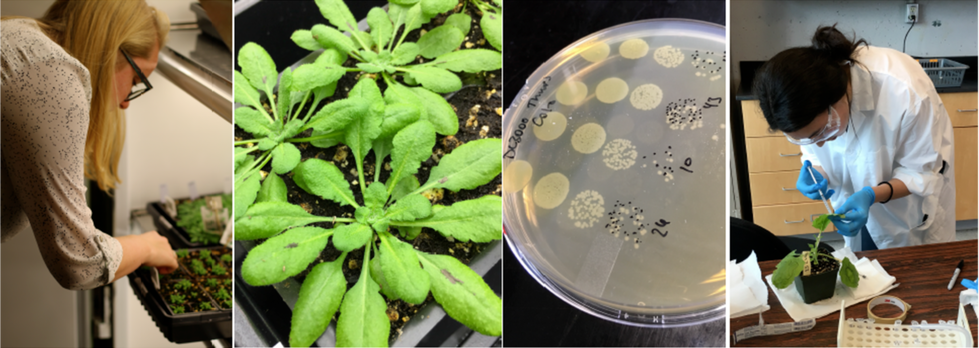plant immunITY research group
DISCOVERING CELLULAR & BIOCHEMICAL MECHANISMS OF STRESS ADAPTATION
|
The unifying theme of our research program is to understand how the plant immune system works, with the ultimate goal of enhancing disease resistance in economically-valuable crops. We mostly work with the model crucifer Arabidopsis thaliana, a close relative of mustard, broccoli, canola, and dozens of other crucifers that are of agricultural significance. Working with A. thaliana offers many advantages over directly studying crop plants, the most important being the wealth of genetic and technological tools available (fully sequenced and annotated genome, thousands of indexed mutants, world-wide data repositories) and the general ease of experimentation (small stature, fast growing time, convenient breeding techniques). Importantly, the discovery of immune proteins in A. thaliana can be translated into technological advances in crops through molecular breeding or genome editing.
We are molecular biologists interested in how plant cells receive and process information about their environment. We use genetic and biochemical approaches to understand signal transduction pathways that allow plants to adapt to stress. An increase in unpredictable and extreme weather has already made tangible impacts on crop yield, and it is expected that new infectious disease outbreaks will emerge. Research aimed at understanding how plants cope with stress is imperative to the protection of this important part of our economy and our domestic food supply. Although our food is highly regulated to ensure low maximum pesticide residue limits for human consumption, Health Canada ‘encourage(s) Canadians, including growers, to reduce their reliance on and minimize their exposure to pesticides.’ This is echoed by the Canadian public. There is a growing interest in urban farms, household gardening, and local markets that provide crops grown without the use of pesticides. Our research program is poised to contribute toward environmentally sustainable crops with boosted immune systems, increasing crop yields and reducing chemical use. |
